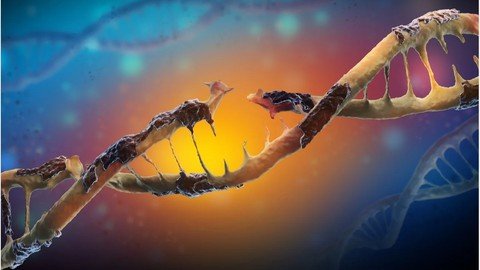
Last updated 5/2022
MP4 | Video: h264, 1280x720 | Audio: AAC, 44.1 KHz
Language: English | Size: 876.00 MB | Duration: 2h 3m
understand DNA damage related all concepts
What you'll learn
DNA damage Introduction
Types of DNA damage
Endogenous damage
Exogenous damage
Point Mutation
Frameshift Mutation
Consequences of Silent and Missense Mutations
Nonsense mutation
Consequence of Frame shift mutation
Disadvantages
Preventive measures
Requirements
Any life science student can learn
Description
DNA damageDNA damage can occur due to various factors such as ionizing radiations, UV light, certain chemicals and also certain metabolites, which can induce oxidative damage to DNA.Example reactive oxygen species.Besides the possible errors in replication, the DNA is constantly subjected to attack by both physical and chemical agents.These include radiations, free radicals ,chemicals etc.,Which also result in mutation.It is fortunate that a great majority of the mutations probably occur in the DNA that does not encode proteins, and consequently will not have any serious impact of the organism.This is not ,however , all the time true , since mutations do occur in the coding regions of DNA also. There are situations in which the change in single base pair in the human genome can cause a serious disease.example sickle-cell anemia Types of DNA damages:The damage done to DNA by physical ,chemical and environmental agents may be broadly classified in 4 categories.1.single base alterations2.two base alterations.3.chain breaks.4.cross- linkages.Since the sources of DNA damage can be roughly divided into two main groups, endogenous damage and exogenous damage. The endogenous damages are the damage caused by reactive oxygen species or some agents else produced from normal metabolic by products, while exogenous damages are caused by external agents, like some radiations, include UV, x-rays; plant toxins; chemicals; viruses.Mutations refers to a change in the DNA structure of a gene.The substances which can induce mutations are collectively known as mutagensA mutation is a change in the DNA sequence of an organism. Mutations can result from errors in DNA replication during cell division, exposure to mutagens or a viral infection.For further learning and more you can find in explanation.
Overview
Section 1: Introduction
Lecture 1 DNA damage Introduction
Lecture 2 Types of DNA damage
Lecture 3 Endogenous damage
Lecture 4 Exogenous damage
Lecture 5 Point Mutation
Lecture 6 Frameshift Mutation
Lecture 7 Consequences of Silent and Missense Mutations
Lecture 8 Nonsense mutation
Lecture 9 Consequence of Frame shift mutation
Lecture 10 Disadvantages
Lecture 11 Preventive measures
All life science students
Homepage
https://www.udemy.com/course/dna-damage-concepts/Links are Interchangeable - No Password - Single Extraction



